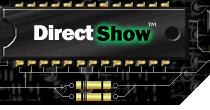



Index
Topic Contents
Previous Topic: IAMDevMemoryAllocator Interface
Next Topic: IAMDirectSound Interface
 |
 | 
|

|
| |||
| |||
IAMDevMemoryControl Interface
The IAMDevMemoryControl interface controls and identify the on-board memory of codecs. A device memory control object supports this interface. This object is aggregated with an IMemAllocator object that is used in the connection. Typically, filters will call the IAMDevMemoryAllocator::GetDevMemoryObject method to obtain a pointer to this interface.
When to Implement
Implement this interface with the IAMDevMemoryAllocator interface when pins need to have greater control of memory allocation.
When to Use
Use this interface to synchronize the completed data write of a memory allocator, and to get the device ID of the on-board memory allocator.
Methods in Vtable Order
IUnknown methods Description QueryInterface Retrieves pointers to supported interfaces. AddRef Increments the reference count. Release Decrements the reference count.
IAMDevMemoryControl methods Description QueryWriteSync Checks if the memory supported by the allocator requires the use of the WriteSync method. WriteSync Used to synchronize with the completed write. This method returns when any data being written to the specified allocator region is fully written into the memory. GetDevId Retrieves the device ID of the on-board memory allocator. IAMDevMemoryControl Interface
IAMDevMemoryControl::GetDevIdRetrieves the device ID of the on-board memory allocator.
HRESULT GetDevId(
DWORD *pdwDevId
);Parameters
- pdwDevId
- [out] Pointer to the device ID.
Return Values
Returns an HRESULT value that depends on the implementation of the interface.
Remarks
This method retrieves a unique ID that the hardware filter can use to verify that the specified allocator passed uses its on-board memory (because there can be more than one). The ID will be the same one as used to create the allocator object (using CoCreateNamedInstance). For another filter to be able to use the on-board memory, it must have the same device ID as the on-board memory allocator.
IAMDevMemoryControl Interface
IAMDevMemoryControl::QueryWriteSyncChecks if the memory supported by the allocator requires the use of the IAMDevMemoryControl::WriteSync method.
HRESULT QueryWriteSync( );
Return Values
Returns S_OK if the method is required, or S_FALSE otherwise.
Remarks
Not all on-board memory needs to have WriteSync called to synchronize with the completed write. This method is used to check if the call is necessary.
IAMDevMemoryControl Interface
IAMDevMemoryControl::WriteSyncUsed to synchronize with the completed write. This method returns when any data being written to the particular allocator region is fully written into the memory.
HRESULT WriteSync( );
Return Values
Returns an HRESULT value that depends on the implementation of the interface. Common return values include:
Value Meaning E_FAIL A time-out has occurred without confirming that data was written. S_OK Operation proceeded normally. VFW_E_NOT_COMMITTED The allocator hasn't called the IMemAllocator::Commit method. Remarks
This method guarantees that all prior write operations to allocated memory have succeeded. Subsequent memory write operations require another call to WriteSync.
This method is implementation dependent, and is used (when necessary) to synchronize memory write operations to the memory. The driver of the on-board memory provides the implementation.
The IAMDevMemoryControl interface is typically found on memory that is accessed through a PCI-bridge. Memory behind a PCI bridge must be synchronized after a memory write operation completes if another device will access that memory from behind the PCI bridge. This is because the host access to the memory is buffered via the PCI bridge FIFO (first in first out), and the host will think the write is completed before the bridge actually writes the data. A subsequent action by a device behind the bridge, such as a SCSI controller, might read the memory before the write is completed if the IAMDevMemoryControl::WriteSync method is not called.
© 1998 Microsoft Corporation. All rights reserved. Terms of Use.